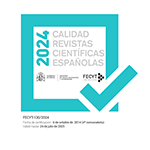The terms tragoedus, comoedus, tragicus and comicus in the work of Isidore of Seville
Abstract
Throughout his work, Isidore of Seville provides distinct reflections on theatre and the different theatrical trades. Bearing in mind the totality of the Isidorian passages in which they appear, we analyse in this article the acceptations that the terms «tragoedus», «comoedus», «tragicus» and «comicus» have in the work of the Sevillian archbishop. The scarce bibliography on the matter has suggested the existence of an alleged Isidorian confusion between the terms «tragoedus» and «tragicus» on the one hand and «comoedus» and «comicus» on the other. According to the critics, the first two items were used interchangeably by Isidore to refer to both the actors and the authors of a tragedy; likewise, the latter two were employed without distinction to mean those of a comedy. The present study aims, nevertheless, to clarify Isidore's degree of knowledge of the meaning of these nouns as well as his mayority trend when using them.
Downloads
Article download
License
In order to support the global exchange of knowledge, the journal Cuadernos de Filología Clásica. Estudios latinos is allowing unrestricted access to its content as from its publication in this electronic edition, and as such it is an open-access journal. The originals published in this journal are the property of the Complutense University of Madrid and any reproduction thereof in full or in part must cite the source. All content is distributed under a Creative Commons Attribution 4.0 use and distribution licence (CC BY 4.0). This circumstance must be expressly stated in these terms where necessary. You can view the summary and the complete legal text of the licence.








